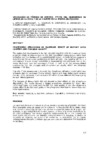Please use this identifier to cite or link to this item:
https://accedacris.ulpgc.es/jspui/handle/10553/76208
| Title: | Utilización de fósforo en dorada. Efecto del incremento de lípidos en la dieta y de la calidad de la harina de pescado | Authors: | Molina Domínguez, Lucia Robaina, L. Garavote, O. Montero, D. Vergara Martín, J. M. Izquierdo, M. S. |
UNESCO Clasification: | 251092 Acuicultura marina | Keywords: | Aquaculture Nutrition Seabream Digestibility Environmental impact, et al |
Issue Date: | 1999 | Conference: | VII Congreso Nacional de Acuicultura | Abstract: | The aquaculture development in the last ten years together with its enormous future projection imply an improvement on the diet formulation considering a better feed utilization and the decrease of its environmental impact, as both factors suppose a restriction on the increasing proliferation of these activities. The negative effects as a consequence of poor dietary formulation or management are principally due to the waste discharges from the non-ingested feed, as well as to the non-assimilated nutrients by the fish, nitrogen and phosphorus principally, which are otherwise essential in fish diets.
The aim of the present work is to study the phosphorus utilization contained in four differents diets far sea bream (Sparus aurata), related with their dietary lipid contents (14 and 27%). Moreover, it was evaluated the effect of two different fish mea! quality for each dietary lipid level.
The increase of dietary lipids did not showed a clear effect on the phosphorus digestibility. The results showed a bigger phosphorus retention for those diets containing higher lipid levels and the best fish meal quality. lt was also observed a higher effect of the fish meal quality in the phosphorus retention for those diets with lower lipid contents. La expansión de la acuicultura en la última década y su enorme proyección de futuro lleva aparejada, tanto un interés por la mejora en la formulación de las dietas como una creciente sensibilización hacia los efectos medioambientales de la producción acuícola, ya que ambos factores pueden suponer un freno a la creciente proliferación de estas actividades. Los efectos negativos consecuencia de un mal manejo y/o formulación del alimento son debidos principalmente a la descarga al medio de alimento no ingerido, así como a los nutrientes no asimilados por los peces, principalmente nitrógeno y fósforo que por otro lado son elementos imprescindibles en las dietas. |
URI: | https://accedacris.ulpgc.es/handle/10553/76208 | Source: | VII Congreso Nacional de Acuicultura, Mayo 1999, Las Palmas de Gran Canaria, p. 279-284 |
| Appears in Collections: | Actas de congresos |
Page view(s)
159
checked on Jan 11, 2025
Download(s)
135
checked on Jan 11, 2025
Google ScholarTM
Check
Share
Export metadata
Items in accedaCRIS are protected by copyright, with all rights reserved, unless otherwise indicated.
